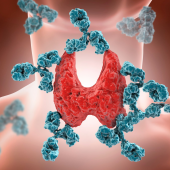Curbside consultations are as old as the medical profession. A “curbside consult” is when one practitioner gets help or advice from another in order to manage a challenging patient.
We asked naturopathic oncologist Dr Lise Alschuler to give us a curbside consultation on the subject of Breast Cancer.
We began by asking her why she chose to specialize in this challenging field.
“When I was an undergrad, I wasn't really sure what I wanted to do. I had this elective course where these individuals who had been diagnosed with cancer came up in front of this large classroom and just shared their stories.
And I was blown away.
I was blown away by the wisdom, the courage, the humanity that these people had that I just hadn't experienced in another group of people.
I realized that the common denominator of these people of different ages, different genders, different races was a diagnosis of cancer. So it was really at that point that I thought, I want to work with people like that.
There's just so much to learn, so much to know. It forced me to be collaborative and integrated, which I also really like. So there's a lot that has been very fulfilling for me”.
In this first episode of Curbside Consult on Breast Cancer with Dr. Lise Alschuler, we discuss the different stages of the cancer diagnosis, characteristics that come into play when we are classifying tumors and importantly, how to handle that first intake interview.
Dr Lise Alschuler ND, FABNO, is a naturopathic doctor with an oncology practice out of Naturopathic Specialists in Scottsdale, AZ. Dr Alschuler has board certification in naturopathic oncology and has been practicing since 1994.
She received a doctoral degree in naturopathic medicine from Bastyr University.
Key Take-Aways
What makes the diagnosis of breast cancer particularly challenging for women?
Any diagnosis of cancer is going to be traumatizing, but I think breast cancer is particularly traumatic because of the body image issues, the knowledge that there is a lot of treatment ahead, and the knowledge that women are often in the position of being caregivers.
It can be a very beautiful thing in the end for some people as it helps to realign priorities and what's important. But it's also very traumatic.
How long does it take in your experience for a woman to seek out a naturopath to be part of her treatment team?
Some women are proactive right from the beginning, and will not proceed with conventional treatment until they consult with a naturopathic doctor. Others will proceed along the conventional route until they hit a roadblock.
What can you share with us as to how to handle that first intake interview?
It's important to acknowledge the challenges that the individual in front of you is facing and to recognize the complexity of the disease. You can help them sort through the complexity by offering yourself as a sounding board and helping to bring things into greater focus. Medicine can offer hope, but it can't guarantee a cure. Instead, doctors can say they will do everything they can to encourage the longest survival possible and the best quality of life possible.
What do we mean when we say the stages of breast cancer?
The breast cancer TNM staging system is the most common way that doctors stage breast cancer. TNM stands for:
- Tumor
- Node
- Metastasis
The framework for understanding the disease is by going from stage zero to stage four, and the TNM classification helps us to understand the extent of the disease. It takes into account the size of the tumor, the presence or absence of involvement by lymph nodes and then whether or not there is metastatic disease.
How would a specialist ascertain where and what stage cancer is present?
There's now at least four different types of breast cancer that have been characterized.
There's three ways that they establish the staging. One is the initial biopsy.
When a woman is diagnosed with breast cancer, her biopsy will categorize the type of cancer based on the type of receptors that the cancer cells express and the amount of proliferation that's present in the tumor.
Then through a series of imaging. And then when they finally remove the tumor they have a chance to see whether it's spread to the tissue around it or the lymph nodes and so on. When a woman's tumor is resected, her stage of cancer is determined by the size and proliferation of the tumor.
If she has chemotherapy before her first surgery, her staging is affected.
Beyond TMN, there are also other characteristics that come into play when we are classifying the tumor, such as estrogen and progesterone.
The TNM is very important, but the way oncology is moving is to get very personalized. And the first thing we want to know is whether the cancer has left the breast tissue, and if it has estrogen and progesterone receptors.
It's really the estrogen receptor that's more important. So the presence or absence of those receptors, will tell us a lot about what the likely behavior of that cancer is.
What does Ki-67 Positive mean?
Tumors are classified as having a high or low Ki-67 index based on a prespecified cutoff. Tumors with a high Ki-67 index have a larger number of proliferating cells and are therefore likely to grow more quickly.
Genetic information about breast cancer cells is increasingly being used by doctors to categorize the disease. Treatment decisions are guided by these groups. Breast cancer groups include:
- Group 1 (luminal A) Luminal A breast cancers are likely to benefit from hormone therapy and may also benefit from chemotherapy.
- Group 2 (luminal B) Luminal B breast cancers are likely to benefit from chemotherapy and may benefit from hormone therapy and treatment targeted to HER2 gene.
- Group 3 (HER2 positive) HER2 breast cancers are likely to benefit from chemotherapy and treatment targeted to HER2 gene.
- Group 4 (basal-like) Basal-like breast cancers are likely to benefit from chemotherapy.
So all of these things are very important in determining what treatments are available to a woman and also help the oncologist gauge her prognosis.
In the next episode Dr Alschuler will discuss early stage breast cancer in detail and how best to manage your patient’s mental health during treatment.
===
The opinions expressed in this Nutramedica program are those of the guests and contributors. They do not necessarily reflect the opinions of Nutritional Fundamentals For Health Inc.
This video is intended for licensed or registered health professionals and students of health professions only. These statements have not been evaluated by the Food and Drug Administration. Information contained in these programs is not intended to diagnose, treat, cure, or prevent any disease.



